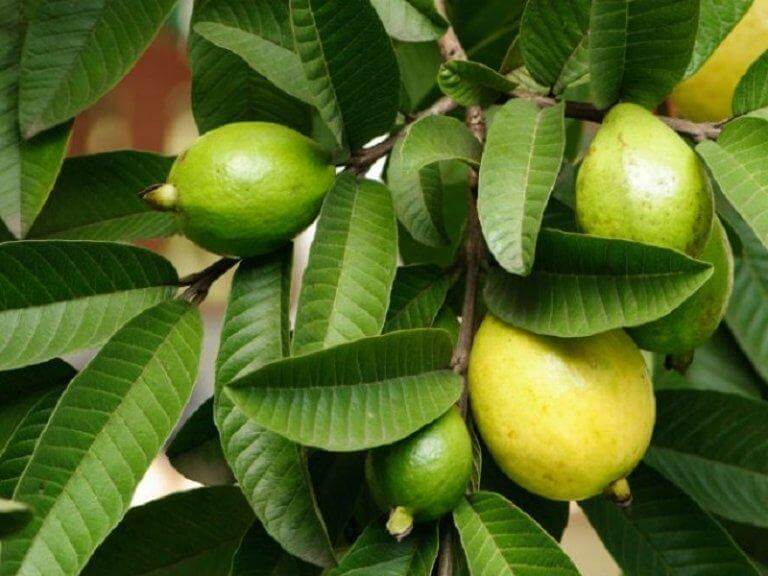Guava Leaves for Damaged Hair

Guava leaves have microbial and astringent properties that help cleanse the body. This is a tropical fruit native to South America and is often used above all to relieve bleeding gums and bad breath.
Guava and its properties have accompanied the home since ancient times, since it has been used to accompany meals and its peels to eliminate bad odors.
The leaves of this fruit have important medicinal properties, among which we can highlight the anti-inflammatory and analgesic ones, according to this study carried out by the University of Campinas (Brazil). Thus, they help relieve many common diseases.
Guava leaves and their benefits

Guava leaves have a large number of nutrients that allow them to be of great use by offering a wide range of health benefits.
Among these properties, their high content of antioxidants stands out as it is rich in carotenoids and flavonoids. In addition, these leaves are of great importance from the point of view of alternative medicine, since they’re used in the manufacture of natural products. They are marketed in the form of tea or capsules, as nutritional supplements.
Guava is rich in a large number of nutrients that provide benefits to health, skin and hair. One of the reasons that it is good for your hair is its high content of vitamins B, C, and A.
This vitamin helps hair growth and health. Vitamin B2 is essential for tissue restoration, as this National Institutes of Health report states. Because of this, it’s included in many hair care products.
Guava leaves are essential to prevent hair loss, especially when used continuously for scalp care. It also repairs damage to damaged hair and is ideal for oily hair, since it manages to reduce the concentration of lipids.
A remedy with guava leaves for damaged hair
A study published in the journal Foods determined that guava leaves have antioxidant and lipid-lowering properties. In addition, they are rich in different phytochemicals such as apigenin and avicularin, in this sense, they could be beneficial for treating damaged hair.
Ingredients
- 4 cups water (1 liter)
- 1 handful of guava leaves
What should you do?
- Simply boil a liter of water with the guava leaves.
- Let it cool and gently apply it throughout your hair from the root to the tips.
Guava is also effective in treating dandruff, and fighting split ends. In this case, grind the guava leaves and make an ointment with hot water to apply to the scalp and ends. It will help you, in a considerable way, to treat this discomfort.
Other uses of guava
Guava tea has revolutionized natural medicine because it helps people lose weight and ease anxiety. Likewise, it’s also suitable to help fight anemia (as this research from The Foundation for Medical Research suggests).
Diabetes is another disease that can be treated with guava leaves, as confirmed by this study carried out by the University of Taiwan. It also provides great benefits for the heart, according to this study from the University of Granada (Spain).
Take a look at this article: What Are the 8 Initial Symptoms of Diabetes?
For the heart

Guava is acidic, has an alkaline reaction, and is high in vitamin C and vitamin A. It also contains potassium, phosphorus, sulfur, and iron. It’s good for the skeletal and lymphatic systems.
On the other hand, guava leaf tea can also benefit your heart and circulatory system. The compounds of the leaves can help lower your blood pressure and heart rate.
This was published in a study about animals with high blood pressure that were given guava leaf extract. It resulted in decreasing their blood pressure and cardiac rates.
Drinking guava leaf tea could also improve your blood lipid levels. Likewise, guava leaves may help decrease the blood cholesterol and unhealthy triglycerides in humans.
Guava for diabetes

The high content of antioxidants in the leaves of this fruit has multiple health benefits, from reducing stress to preventing diseases and delaying aging.
There are many benefits of guava leaves for diabetes. In addition, they can be used to treat various health conditions. For example, guava leaf infusion can be included with every meal to improve hypoglycemia and insulin resistance.
Finally, you should not forget to try to have a healthy lifestyle, do daily physical exercise, and eat a good diet.
A fruit with multiple benefits
Guava has multiple health benefits, most of them supported by scientific studies. In this sense, you can try the aforementioned remedy for damaged hair and return to showing off beautiful hair without the need to use chemical products.
All cited sources were thoroughly reviewed by our team to ensure their quality, reliability, currency, and validity. The bibliography of this article was considered reliable and of academic or scientific accuracy.
- Luo Y, Peng B, Wei W, Tian X, Wu Z. Antioxidant and Anti-Diabetic Activities of Polysaccharides from Guava Leaves. Molecules. 2019 Apr 5;24(7):1343.
- Díaz-de-Cerio E, Verardo V, Gómez-Caravaca AM, Fernández-Gutiérrez A, Segura-Carretero A. Health Effects of Psidium guajava L. Leaves: An Overview of the Last Decade. Int J Mol Sci. 2017 Apr 24;18(4):897.
- Jayachandran M, Vinayagam R, Xu B. Guava leaves extract ameliorates STZ induced diabetes mellitus via activation of PI3K/AKT signaling in skeletal muscle of rats. Mol Biol Rep. 2020 Apr;47(4):2793-2799.
- Kumar M, Tomar M, Amarowicz R, Saurabh V et al. Guava (Psidium guajava L.) Leaves: Nutritional Composition, Phytochemical Profile, and Health-Promoting Bioactivities. Foods. 2021 Apr 1;10(4):752.
- Chandran KD, Karthikeyan K, Sujatha V, Mahalaxmi S. Antibacterial evaluation of guava leaves extract and its effect on reactive oxygen species formed by calcium hydroxide and chlorhexidine mixture. J Conserv Dent. 2021 Jul-Aug;24(4):389-392.
This text is provided for informational purposes only and does not replace consultation with a professional. If in doubt, consult your specialist.








